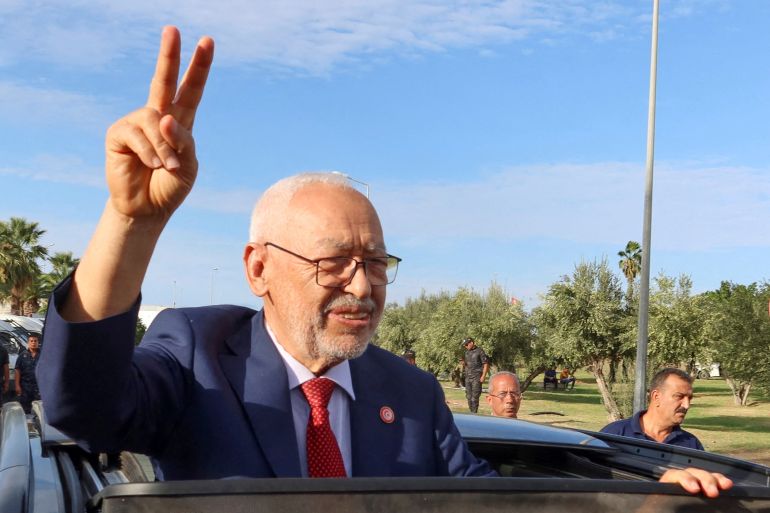Families of jailed Tunisian opposition ask ICC to investigate president
Relatives go to The Hague to pressure the court to go after leaders in Tunis over alleged rights abuses.

The children of four jailed Tunisian opposition figures have called on the International Criminal Court (ICC) to investigate claims of political persecution and the deteriorating human rights situation in the North African country.
At a press conference in The Hague on Thursday, Netherlands, the families’ lawyer said they have filed a complaint at the ICC calling on its prosecutor to investigate the country’s leaders.
Keep reading
list of 3 itemsDetermination, hope and longing in the Tunisians fighting for a better life
The EU’s extractive trade policies in Tunisia contribute to migration
Present were the sons and daughters of opposition Ennahdha party head Rached Ghannouchi, lawyer and prominent government critic Ghazi Chaouachi, writer and activist Chaima Issa and Ennahdha politician Said Ferjani.
“We have had to make this filing because it is the government itself that is carrying out these crimes,” lawyer Rodney Dixon said, adding that the actions amount to “crimes against humanity”.
Mass detentions, one-man rule
Since President Kais Saied came to power at the end of 2019, his rule has become increasingly oppressive.
In July 2021, he suspended the parliament, in which Ennahdha had a plurality; fired the prime minister, Hichem Mechichi; and began ruling by decree – moves that were condemned and branded a coup by the opposition. He also dissolved the judicial council, which guarantees the independence of judges.
Since then, there have been several rounds of arrests that have resulted in the detention of several senior opposition politicians, former ministers, scholars, business figures and activists.
Protests against the detentions, Saied’s one-man rule and lack of progress on improving the economy have been held regularly, and security forces have responded violently.
On Wednesday, 60 activists went on a one-day hunger strike to protest “arbitrary arrests and unfair trials” of the president’s opponents.
On Friday, Ghannouchi, 84, began a three-day hunger strike to protest his detention and show support for other “political prisoners”.
A court sentenced Ghannouchi, a former speaker of parliament, to one year in prison on “terrorism” charges in May, a charge his party says is politically motivated. He was arrested in April.
“My father went on hunger strike to protest his unjust detention and that of other detainees, both political detainees and activists,” Yusra Ghannouchi told Al Jazeera, from The Hague. “He is calling for the restoration of democracy and the rule of law in our country.
“He went on a hunger strike because he had no other option. Saied has dismantled all independent bodies and institutions in the country.”
“In the last two years, all he [Saied] has been doing is bringing back dictatorship to Tunisia,” the former spokesperson of Ennahdha added. “He has no solution to the problems facing the country like the economy, which has gotten worse since he grabbed power. There are no checks and balances left in the country. That is why many politicians and activists are going on strike.”
‘He’s not sensitive to pressure’
Analysts say the filing of the ICC complaint may not make a difference to Saied.
“I don’t think it will make any difference to him. He’s not sensitive to pressure. The regime will be worried about the impact of what this is going to do. It is a problem, which they would have preferred not to have,” analyst Hatem Nafti told Al Jazeera.
“It will have a moral impact. Those who support him will now take notice of his actions. They will start doubting him even more. This is definitely not good for his image or what is left of it,” he added.
On Tuesday, Abir Moussi, the head of the Free Destourian (Constitutional) Party and an outspoken critic of Saied, was arrested.
Moussi was detained outside the presidential palace, where she went to file a challenge against a recent presidential decree on holding local elections this year, her party said.
Criticism in coming not only from within Tunisia. The international human rights group Amnesty International accused Saied of stifling political opposition and taking steps that repress free expression.
“Decree by decree, blow by blow, President Saied and his government have dramatically undermined respect for human rights in Tunisia,” Heba Morayef, Amnesty’s regional director for the Middle East and North Africa, said in a statement.
“He has stripped away basic freedoms that Tunisians fought hard to earn and fostered a climate of repression and impunity. The Tunisian authorities must immediately reverse this treacherous trajectory and uphold their international human rights obligations,” she added.
Democracy derailed?
In recent years, Tunisia’s status as the only democratic success story stemming from the Arab Spring uprisings has been tarnished.
The country of 12 million people has also been grappling with economic turmoil and a high unemployment rate as well as severe water shortages.
Dire economic pressure and political oppression have pushed many Tunisians to flee the country, hoping to save themselves and their families.
They are not the only ones. Tunisia’s proximity to the Italian island of Lampedusa in the Mediterranean Sea has made it a departure point for many Africans and Arabs fleeing similarly hopeless situations in their own countries.
As asylum seekers wait for a chance to leave Tunisia on rickety boats that have killed more than 2,500 people alone this year, according to the United Nations, they have found themselves at the receiving end of racist diatribes from Saied, who accused them of being part of a conspiracy to destroy Tunisia’s “Arab character”.